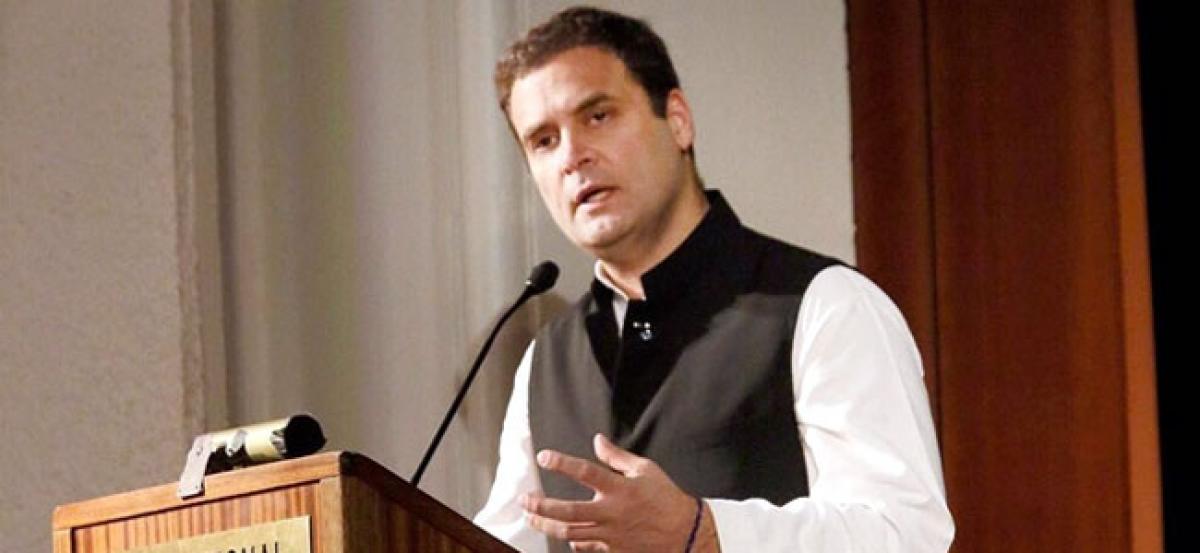Live
- Aaditya Thackeray Calls For EOW Probe Into Mumbai's Rs 7,000 Crore Road Project
- Omar Abdullah Urges Congress To Earn INDIA Bloc Leadership Role
- Yogi Adityanath Contrasts Historical And Modern Treatment Of Workers In India
- Historic Temple In Sambhal Reopens After 46-Year Closure Following 1978 Riots
- Officials directed to work for deeper reach of guarantees
- Delay In 'One Nation, One Election' Bills Introduction Announced
- Exhilarating ‘Benchmark’ of Venkat Changavalli
- Development activities worth `30 cr launched in Puthalapattu constituency
- Allegations against KTR baseless: BRS leader
- Megastar Chiranjeevi to Visit Allu Arjun’s Residence at 12 PM Today
Just In

India can wipe out poverty by 2030 if it grows at over eight per cent for the next 13 years, Congress Vice President Rahul Gandhi has said, and noted that India has to create jobs in a democratic environment unlike China and does not want the \"coercive instruments\" of its western neighbour.
Berkeley: India can wipe out poverty by 2030 if it grows at over eight per cent for the next 13 years, Congress Vice President Rahul Gandhi has said, and noted that India has to create jobs in a democratic environment unlike China and does not want the "coercive instruments" of its western neighbour.
Addressing a gathering on Monday night at the University of California, Berkeley, on 'India at 70: Reflections on the Path Forward', Gandhi also slammed the Modi government saying 30,000 youngsters were joining the job market every single day and yet the government is creating only 500 jobs a day.
He said India for the first time in its history has an opportunity to wipe out poverty.
"If India is able to lift another 350 million people out of poverty by 2030, it would be an achievement that the human race can be proud of. Doing this would require us to grow by more than over 8 per cent in the next 13 years. India has done it before and can do it again. But it is imperative that India sustain a high growth rate for an uninterrupted period of 10-15 years in order to do so," he said.
He termed job creation a "central challenge" and said no amount of growth is enough for India if it's not accompanied by the creation of jobs.
Gandhi said roughly 12 million young people enter the Indian job market every year.
"Nearly 90 per cent of them have a high school education or less. India is a democratic country and unlike China, it has to create jobs in a democratic environment. India does not have and nor does it want China's coercive instruments. We cannot follow their model if massive factories are controlled by fear," Gandhi said.
He said jobs in India are going to come instead from small and medium scale industries and there is need to turn a colossal number of small and medium businesses into international companies.
"Currently, we are not producing enough jobs. 30,000 new youngsters are joining the job market every single day and yet the government is only creating 500 jobs a day. And this doesn't include the massive pool of already unemployed youngsters," he said.
Gandhi said that attention, at present, is being paid to the top 100 companies. "Everything is geared towards them. Banking systems are monopolised by them, the doors of government are always open to them and laws are shaped by them. Meanwhile, entrepreneurs running small and medium businesses struggle to get bank loans. They have no protection and no support. Yet these small and medium businesses are the bedrock of India and the world's innovation."
The Congress leader said big businesses can easily manage the unpredictability of India. "They are protected by their deep, deep pockets and connections. But the real innovative strength of India lies with the millions of small firms and young entrepreneurs that run them. And they are relying on us to build the financial, communication and political infrastructure that would allow them to turn their skills into global businesses," he said.
Gandhi said that thousands of years of cross culturalism means that India has the world's most genetically diverse population. "If medical processes are going to be based on DNA, then India's diversity is going to be a huge global asset. It is imperative that we start thinking about these systems now while addressing the critical concerns of privacy and ownership before they arise."

© 2024 Hyderabad Media House Limited/The Hans India. All rights reserved. Powered by hocalwire.com







